The question of whether cats can safely consume blueberries, considered a superfood for humans, presents an intriguing intersection of dietary considerations. While the vibrant hue and nutritional benefits of blueberries may seem appealing, the implications of introducing this fruit into a feline diet are nuanced.
From exploring the potential health benefits to navigating possible risks associated with blueberry consumption for cats, understanding the intricacies of this decision is crucial for responsible pet ownership.
Let's unravel the complexities of incorporating blueberries into a cat's diet to ensure their well-being and vitality are prioritized.
Key Takeaways
- Blueberries are safe for cats but not essential in their diet.
- Prioritize nutrients over treats for cats.
- Consult a vet before introducing new foods.
- Treats like blueberries should be offered in moderation.
Blueberries and Cat Nutrition
Blueberries can be a supplementary source of nutrients for cats, albeit not a necessary component in their diet due to their obligate carnivore nutritional requirements. While cats can derive some benefits from the antioxidants and fiber found in blueberries, their primary diet should consist of a complete and balanced commercial cat food that meets all their nutritional needs.
It is essential to prioritize essential nutrients over treats like blueberries to ensure optimal health for your feline companion. Consulting with a veterinarian before introducing new foods, including blueberries, is advisable to prevent any potential adverse effects, especially in cats with specific health conditions like diabetes.
Remember to offer treats in moderation, ensuring that the majority of their caloric intake comes from their main diet.
Cat-Safe Blueberry Consumption
Supplementing a cat's diet with blueberries can offer additional nutrients, although their consumption should be approached cautiously to ensure feline safety and well-being. When feeding blueberries to your cat, remember to:
- Consult with your veterinarian: Ensure that introducing blueberries aligns with your cat's dietary needs.
- Limit portion size: Treats should only make up a small percentage of your cat's daily caloric intake.
- Prepare the blueberries: Wash them thoroughly and remove any stems before offering them to your cat.
- Monitor your cat: Watch for any signs of stomach upset or adverse reactions after trying blueberries for the first time.
Blueberry Risks for Cats
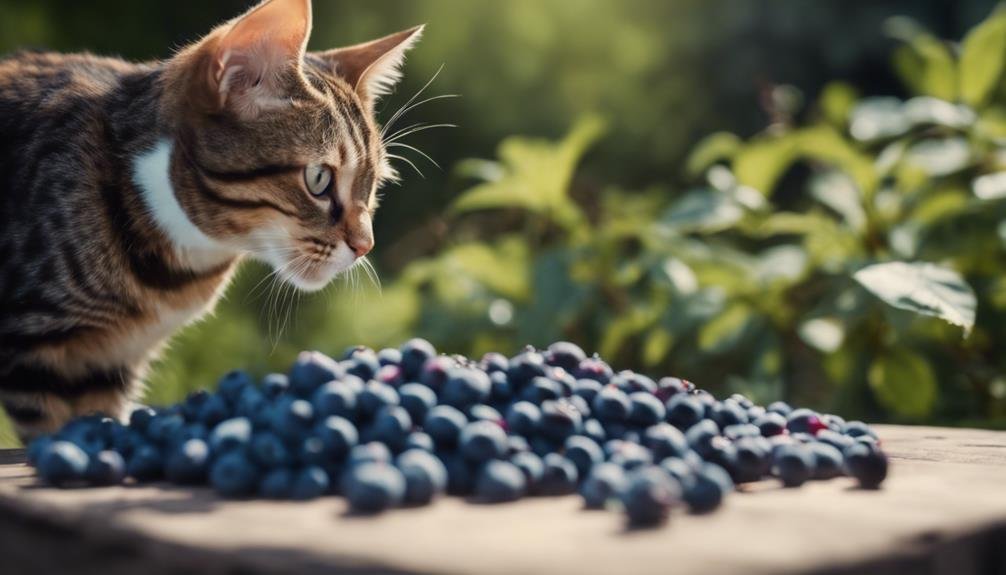
When considering the inclusion of blueberries in a cat's diet, it is crucial to be aware of potential risks that may impact their well-being. While blueberries are generally safe for healthy cats, there are some considerations to keep in mind. Cats with diabetes may need to avoid blueberries due to their sugar content. Additionally, introducing new foods like blueberries can sometimes lead to gastrointestinal issues such as vomiting or diarrhea. Treats, including blueberries, should be given in moderation, with the majority of calories coming from a balanced diet. Consult your veterinarian before offering blueberries to your cat to ensure their safety and well-being.
| Blueberry Risks for Cats | ||
|---|---|---|
| Safe for Healthy Cats | Not Suitable for Cats with Diabetes | Potential for Gastrointestinal Upset |
| Offer in Moderation | Consult Veterinarian Before Introducing | Prioritize Balanced Diet |
Diabetes Concerns With Blueberries
Considering a cat's dietary needs, awareness of potential risks like diabetes in relation to introducing blueberries is essential for their overall well-being. When it comes to diabetes concerns with blueberries, it's crucial to keep in mind:
- Sugar Levels: Blueberries contain natural sugars that could affect a cat's blood sugar levels.
- Insulin Sensitivity: Cats with diabetes may have issues regulating their blood sugar, making high-sugar foods like blueberries a concern.
- Weight Management: Excessive sugar intake can lead to weight gain, exacerbating diabetes symptoms in cats.
- Consultation: Always consult with a veterinarian before offering blueberries or any new food to a diabetic cat to ensure it aligns with their specific dietary requirements.
Introducing Blueberries to Cats
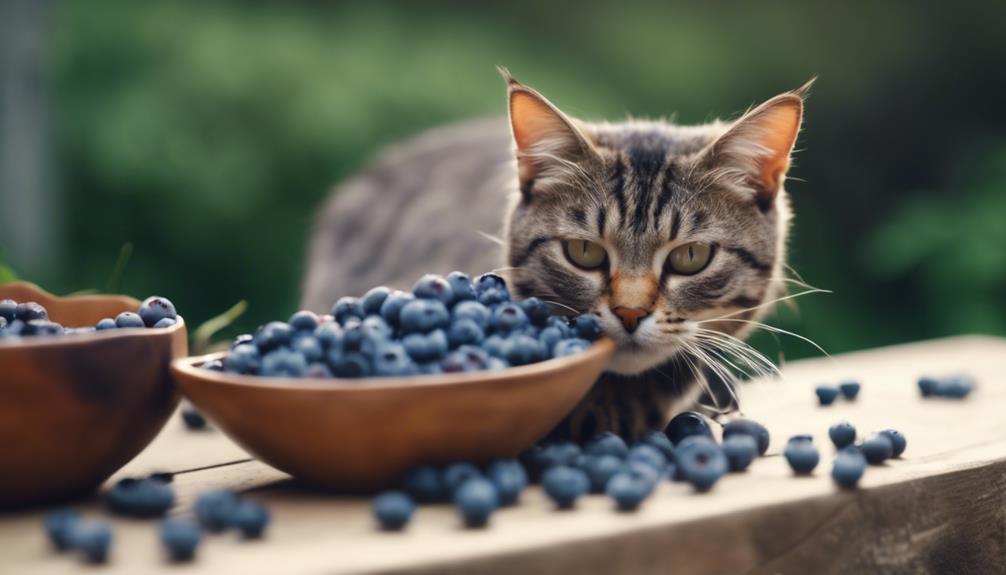
Introducing blueberries into a cat's diet should be approached cautiously and with consideration for their specific dietary needs as obligate carnivores. While blueberries are generally safe for cats, they are not essential in their diet. Cats require a complete and balanced commercial diet that prioritizes essential nutrients over treats.
Blueberries do not need to be a regular part of a cat's diet, and treats should be offered occasionally, with the majority of calories coming from a balanced diet. It's essential to consult a veterinarian before introducing new foods to your cat, ensuring their overall health and dietary requirements are met.
Monitoring Cat Reactions to Blueberries
To ensure the safety and well-being of your feline companion, it is crucial to observe any potential adverse reactions that may arise from introducing blueberries into their diet. When monitoring your cat's reactions to blueberries, consider the following:
- Watch for any signs of gastrointestinal upset, such as vomiting or diarrhea.
- Note any changes in your cat's behavior or appetite after consuming blueberries.
- Keep an eye out for allergic reactions, like itching or swelling.
- Consult your veterinarian if you notice any concerning symptoms or if you are unsure about your cat's response to blueberries.
Blueberries: Treat or Regular Diet?
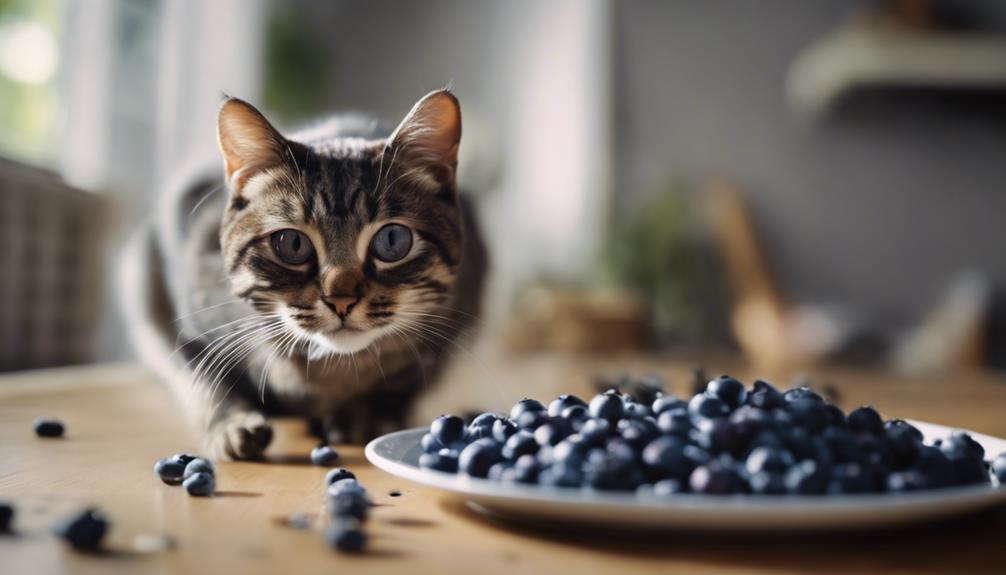
When evaluating the role of blueberries in a cat's diet, it is essential to determine whether they should primarily serve as a treat or be a regular dietary inclusion, considering the specific nutritional needs of felines. Blueberries can be a healthy treat option for cats due to their antioxidant properties and low-calorie content. However, they should not replace essential nutrients provided by a complete and balanced commercial diet tailored to a cat's obligate carnivore requirements.
While blueberries offer benefits, they do not need to be a regular part of a cat's diet. It is crucial to prioritize nutrients over treats, ensuring that the majority of a cat's calories come from their main diet to meet their nutritional needs adequately.
Vet Consultation for Cat Treats
Upon considering treats for your feline companion, it is advisable to seek veterinary consultation regarding appropriate options for their diet. Your veterinarian can provide valuable insights tailored to your cat's specific needs, ensuring their health and well-being are prioritized.
When discussing treats with your vet, consider the following points:
- Veterinarians can recommend suitable treat options based on your cat's age and health status.
- They can advise on the frequency and portion sizes of treats to maintain a balanced diet.
- Your vet can help identify any potential allergies or intolerances your cat may have to certain foods.
- Consulting with a veterinarian ensures that any new treats align with your cat's dietary requirements and overall health goals.
Moderation in Blueberry Treats
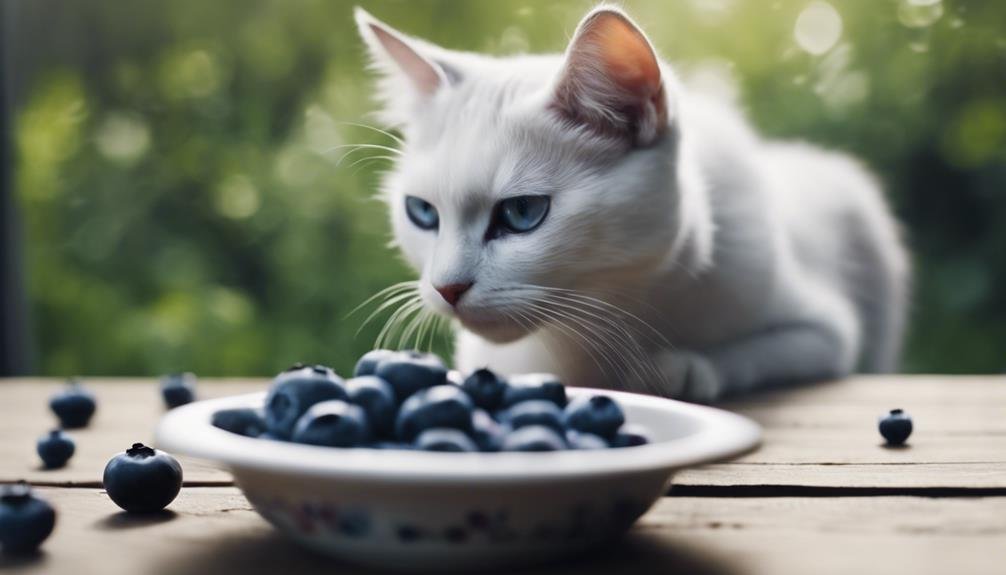
Considering the nutritional needs of cats, incorporating blueberries into their diet should be done cautiously and in moderation. While blueberries offer health benefits like antioxidants, vitamins, and fiber, they should not replace essential nutrients from a balanced commercial diet.
Treats, including blueberries, should only make up a small portion of a cat's daily caloric intake, ideally not exceeding 10%. It's crucial to be mindful of the sugar content in blueberries, especially for cats with diabetes. To prevent any gastrointestinal upset, introduce new treats gradually and monitor your cat's reaction.
Consulting with a veterinarian before introducing blueberries or any new food is always recommended to ensure your cat's diet remains complete, balanced, and tailored to their specific needs.
Preparing Blueberries for Cats
In ensuring the safe inclusion of blueberries in a cat's diet, understanding the proper preparation methods is essential to maintain their overall well-being and dietary balance. When preparing blueberries for cats, consider the following:
- Wash Thoroughly: Rinse the blueberries well to remove any potential pesticides or dirt.
- Remove Stems: Ensure all stems are removed as they can be a choking hazard.
- Cut into Small Pieces: To prevent choking, consider cutting blueberries into smaller, bite-sized pieces.
- Offer Fresh: Serve fresh blueberries to provide the most nutritional benefits for your feline friend.
Blueberries and Cat Health Monitoring
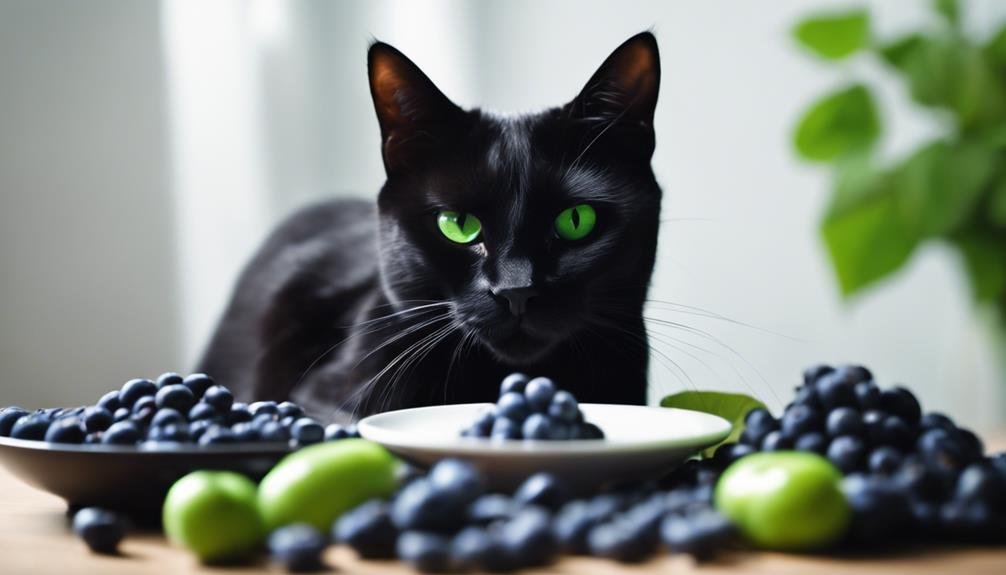
Monitoring a cat's health in relation to their consumption of blueberries is a crucial aspect of responsible pet ownership.
While blueberries can be a healthy treat for some cats, it is essential to monitor their well-being after introducing this fruit into their diet. Keep a close eye on your cat for any signs of gastrointestinal upset, such as vomiting or diarrhea, which could indicate a negative reaction to blueberries.
Introduce new treats, including blueberries, gradually and in moderation to observe any potential issues that may arise. Consulting with a veterinarian before incorporating blueberries into your cat's diet can provide personalized guidance based on your cat's specific health needs, ensuring their well-being and enjoyment of this superfood.
Conclusion
In conclusion, the inclusion of blueberries in a cat's diet can be a beneficial addition if done with caution and moderation. Understanding the nutritional needs of felines and consulting with a veterinarian are essential steps in ensuring the well-being of our furry companions.
By being mindful of potential risks, such as the sugar content in blueberries, pet owners can treat their cats to this superfood in a responsible manner, promoting a balanced and healthy diet.




